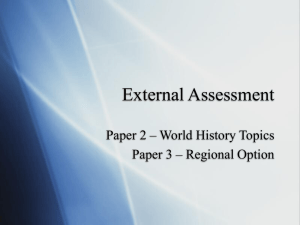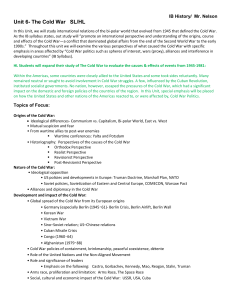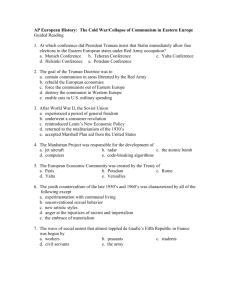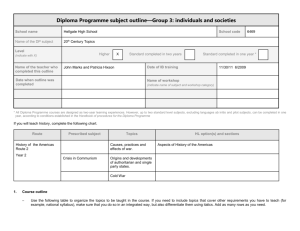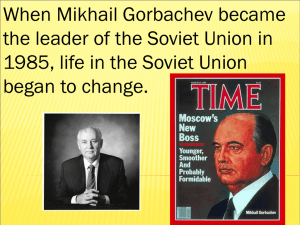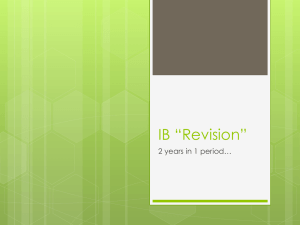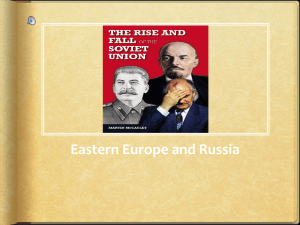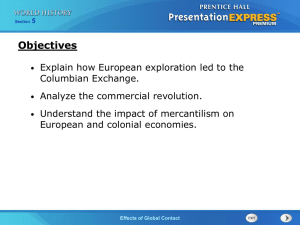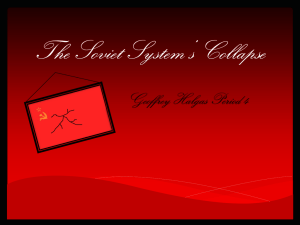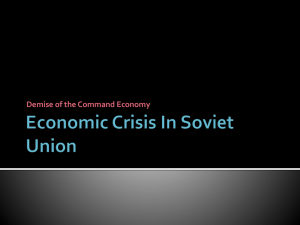IB Study Suggestions and Strategies
advertisement
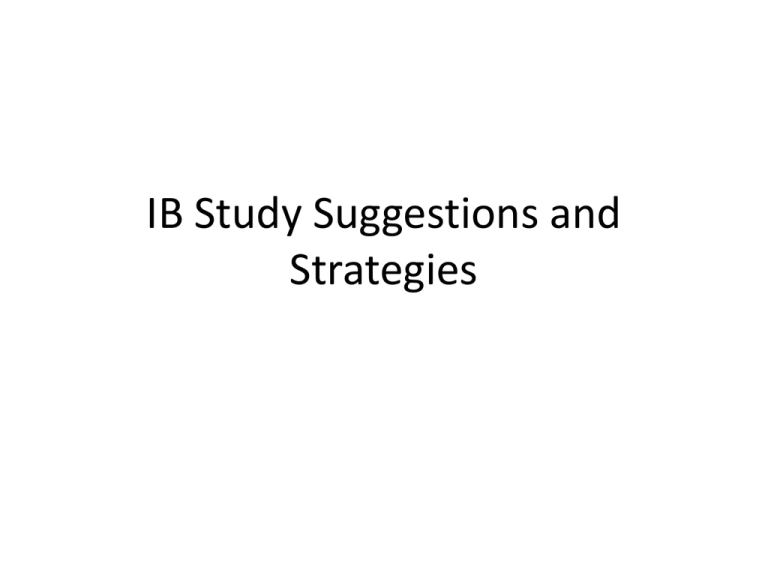
IB Study Suggestions and Strategies Paper 1—Communism in Crisis, 19761989 • China under Deng Xiaoping: economic policies and the Four Modernizations • China under Deng Xiaoping: political changes, and their limits, culminating in Tiananmen Square (1989) • domestic and foreign problems of the Brezhnev era: economic and political stagnation; Afghanistan • Gorbachev and his aims/policies (glasnost and perestroika) and consequences for the Soviet state • consequences of Gorbachev’s policies for Eastern European reform movement • Review OPVL handout Paper 2—Practices and Causes of War • Different types and nature of 20th century warfare (Civil, Guerrilla, Limited war, total war) • Origins and causes of wars (Long-term, shortterm and immediate causes; Economic, ideological, political, religious causes • Nature of 20th century wars (Technological developments, tactics and strategies, air, land and sea) • Home front: economic and social impact (including changes in the role and status of women) Paper 2—Practices and Causes of War • Resistance and revolutionary movements • Effects and results of wars • Peace settlements and wars ending without treaties • Attempts at collective security pre- and postSecond World War • Political repercussions and territorial changes • Post-war economic problems Wars for study • • • • First World War Second World War Chinese Civil War Spanish Civil War Paper 2—Cold War • Origins of the Cold War (Ideological differences, Mutual suspicion and fear, From wartime allies to post-war enemies) • Nature of the Cold War (Ideological opposition, Superpowers and spheres of influence, Alliances and diplomacy in the Cold War) Paper 2—Cold War • Development and impact of the Cold War (Global spread of the Cold War from its European origins; Cold War policies of containment, brinkmanship, peaceful coexistence, détente; Role of the United Nations and the Non-Aligned Movement; Role and significance of leaders; Arms race, proliferation and limitation; Social, cultural and economic impact) • End of the Cold War (Break-up of Soviet Union: internal problems and external pressures Breakdown of Soviet control over Central and Eastern Europe) Paper 2—Cold War • Wartime conferences: Yalta and Potsdam • US policies and developments in Europe: Truman Doctrine, Marshall Plan, NATO • Soviet policies, Sovietization of Eastern and Central Europe, COMECON, Warsaw Pact • Sino–Soviet relations • US–Chinese relations • Germany (especially Berlin (1945-61)), Congo (1960-64), Afghanistan (1979-88), Korea, Cuba, Vietnam, Middle East • Castro, Gorbachev, Kennedy, Mao, Reagan, Stalin, Truman Paper 2 • There are 3 other topics on the exam – Democratic states—challenges and responses – Origins and development of authoritarian and single-party states – Nationalist and independence movements in Africa and Asia post 1945 Central and Eastern European States Paper 3—The Americas Topic • Refer to IB syllabus for Americas Topics from this year • Choose 4-5 topics to focus on. Choose a combo of topics from this year and last year. • Review mark schemes and alternative perspectives. Americas Topics from Year 1 • Independence Movements in the Americas – Causes, Leaders, US Declaration of Independence, Independence Movements in Latin America, US position toward Latin American Independence and the Monroe Doctrine • Nation-building – Articles of Confederation and Constitution, Rise and impact of Caudillos in Latin America, War of 1812, and Mexican-American War Americas Topics from year 1 • US Civil War – Slavery and Underground Railroad, Causes, Arguments for and against slavery, Effects of Westward expansion, Lincoln-Douglass debates, Strengths and weaknesses of the Union and Confederacy, Major battles, Role of foreign powers, and Success and failure of Reconstruction • Modern Nations – Causes and consequences of industrialization; Causes and consequences of immigration; Development and impact of Progressivism, nationalism, nativism. Americas Topics from Year 2 • See IB Syllabus Studying strategies • Use IB objectives and sample questions from lectures to help guide studying. • Flashcards for things you need to memorize. • Practice thesis statements, outlines, etc. • Group or partner discussions • Review practice exams • Choose topics you are interested in or the most comfortable with especially for paper 3. Test Taking Strategies • Relax! • Make outlines and/or notes in your exam before you start writing. • Highlight and/or underline parts of the question to make sure you answer it completely. • Use all time available. Keep track of time. • If you have time re-read your answers before you turn them in and make any edits.
